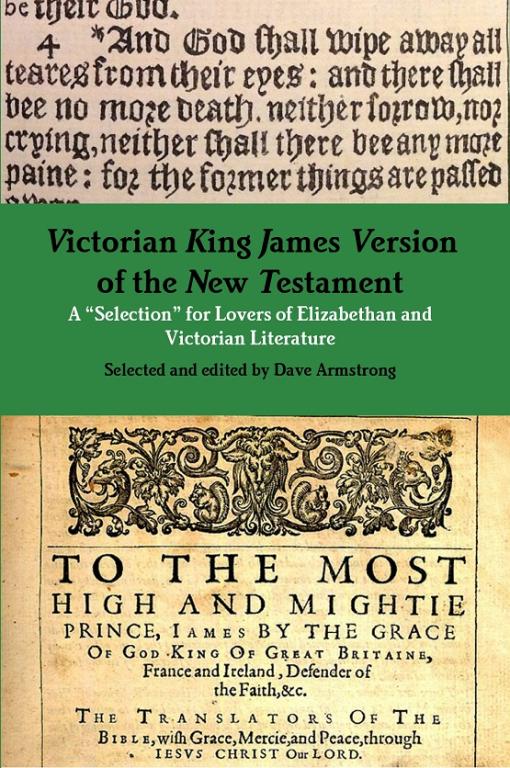
My New Testament, that I edited and compiled from six existing public domain translations [see book and purchase info.]
***
From my Facebook page: 5 June 2016. Words of Marcos Zuñiga will be in blue.
***
The first topic (and one of the most foundational ones) that we will discuss is the issue of authority. Catholics look to a combination of Scripture, Sacred Tradition, and the Magisterium as their final authority, while most Protestants believe in Sola Scriptura (the Bible Alone). But what do Catholics think of Sola Scriptura? This concept is very often misunderstood and misrepresented by most Catholics (and some Protestants, as well). When we say “Bible Alone,” we do not mean that we cannot use other sources of information to help us along in our Christian walk. Neither does it mean that the Bible contains every bit of spiritual information that exists. It is not an exhaustive encyclopedia containing every word that God, the Father, or Jesus Christ, the Son, has ever spoken, nor does it tell us of every single event in Church history. Sola Scriptura does not mean that there are no other authorities, or that the writings of the church fathers are useless. It does not mean that all tradition is bad, or that the Holy Spirit cannot deal with our hearts by other means, as well. It also does not mean that something has to be specifically mentioned in the Bible to be true, or that a person can wrecklessly interpret the Bible any way he wants to.
All very true. What it means is that only the Bible is the infallible, ultimate authority. It’s a denial of the infallibility of the Church and tradition.
And of course, the infallible Bible is only as “good” as the interpretation brought to it. Since Protestants contradict themselves all over the place, the system breaks down and is, I contend, ultimately logically self-defeating.
I like what Boettner said “Whether called Baptist, Methodist, Lutherans, Presbytarians , or what not, they all belong to one body, the church of Christ, just as the 50 states of the United States have various names and local governments but all belong to one nation.
Boettner excludes Catholics from the Church, which is an absurd, self-defeating position.
Anyway, the Catholic church has never issued an official commentary giving her interpretation.
It doesn’t have to. We have dogmas that no Catholic may disagree with. It’s a unified body of belief, passed down consistently through the centuries. We only have “official” interpretations of 7 or 8 Bible passages.
8 verses? That’s quite an admission. Why do Catholics claim Christians need to come to Rome to solve the problem of Scripture’s alleged unclarity on doctrinal issues when Rome has only “dogmatically” interpreted about 8-11 texts for Catholics as even Catholic scholars admit?
Already answered: “We have dogmas that no Catholic may disagree with. It’s a unified body of belief, passed down consistently through the centuries.”
So, e.g., if one interprets a Bible verse in a way that it would supposedly teach that Mary sinned, it wouldn’t be permissible as an opinion in Catholic circles. Likewise, if a Calvinist interprets anything in a way that contradicts TULIP, it wouldn’t be permitted as legitimate exegesis.
It’s the same in that way, but different in that we have one doctrine, and you guys have hundreds of competing ,contradictory versions of the one biblical truth. Lots of falsehoods there, and falsehood is a bad thing.
Okay, but what are we going to do with the 99.99% of the Bible that hasn’t been infallibly interpreted? Who has the “official intepretation”?
I just explained all that. Catholic dogma is the key to exegesis. It can’t be contradicted.
You can see all my old articles on Bible and Tradition issues (argued a billion times) on my index page for that topic.
So nobody can be dogmatic with the rest, I suppose.
You can be “dogmatic” if someone tries to use the Bible to contradict infallible Catholic dogma.
I appreciate [that] you took some time to answer this Protestant.
You’re welcome.
Do you have the list of verses Rome has interpreted?
Yes, I do.
*****
Meta Description: Short discussion on the rule of faith with an informed Protestant.
Meta Keywords: Bible Only, biblical prooftexts, biblical theology, Christian Authority, exegesis, hermeneutics, Holy Bible, infallible authority, Rule of Faith, Sacred Scripture, Scripture Alone, Sola Scriptura












